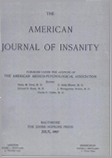CONSEQUENCES OF METRAZOL SHOCK THERAPY
Abstract
Some 320 schizophrenic patients—so diagnosed to the best of our ability—were surveyed physically, neurologically and psychiatrically at least twelve months after the completion of their treatment, in order to establish in so far as possible just what are the risks involved in metrazol shock-therapy. Fifty-one patients in all were thought to show present damage, some of which "damage" might very possibly have occurred without the intervention of this treatment. The evident damages suffered were for the most part confined to three large groups.
Vertebral fractures were numerous in the past, possibly 20-30 per cent. However, 50 patients checked after their treatment in 1940 show no fractures. Our inquiry indicates that thus far at least, spinal compression fractures, though highly undesirable, have not proved to be serious complications.
Pulmonary tuberculosis developed in 25 patients, 8 per cent of all those treated, as contrasted with a 3.0 per cent incidence in non- metrazol-treated schizophrenics during the same period.
Myocardial damage and a tendency to hypertension occurred in a relatively small number of patients.
Defects of memory were not obvious enough to be reported upon.
Clinical evidences of damage to the central nervous system were suggestive but questionable. Elsewhere in the literature we have presented histological evidence of brain damage in experimental animals and in human subjects following the use of metrazol. To the best of our knowledge, no intracranial accidents occurred.
The percentage of mental improvements obtained, including those in out-patients reported upon by social workers, was less than that claimed for "spontaneous" remissions. However, more than 43 per cent of those with a psychosis duration of less than 3 years had improved greatly, whereas in the group of longer duration only 13.2 per cent improved.
Many patients showed improvement by psychological tests who apparently had not improved in adjustment to their life-situation as a whole.
We realize that many of the findings discussed in this report represent conclusions rather than facts, and that upon the whole trends are indicated rather than exact data.
As a result of this investigation, the Elgin staff feels justified in the use of metrazol convulsive shock-therapy—principally in the frankly affective disorders—after careful consideration in each case of possible resultant damage as related to the possibility of improvement.
Access content
To read the fulltext, please use one of the options below to sign in or purchase access.- Personal login
- Institutional Login
- Sign in via OpenAthens
- Register for access
-
Please login/register if you wish to pair your device and check access availability.
Not a subscriber?
PsychiatryOnline subscription options offer access to the DSM-5 library, books, journals, CME, and patient resources. This all-in-one virtual library provides psychiatrists and mental health professionals with key resources for diagnosis, treatment, research, and professional development.
Need more help? PsychiatryOnline Customer Service may be reached by emailing [email protected] or by calling 800-368-5777 (in the U.S.) or 703-907-7322 (outside the U.S.).



